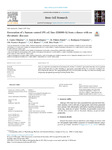Mostrar o rexistro simple do ítem
Generation of a human control iPS cell line (ESi080‐A) from a donor with no rheumatic diseases
| dc.contributor.author | Castro Viñuelas, Rocío | |
| dc.contributor.author | Sanjurjo-Rodríguez, Clara | |
| dc.contributor.author | Piñeiro-Ramil, María | |
| dc.contributor.author | Rodríguez-Fernández, Silvia | |
| dc.contributor.author | Fuentes Boquete, Isaac Manuel | |
| dc.contributor.author | Blanco García, Francisco J | |
| dc.contributor.author | Díaz-Prado, Silvia | |
| dc.date.accessioned | 2020-04-23T09:42:33Z | |
| dc.date.available | 2020-04-23T09:42:33Z | |
| dc.date.issued | 2020-03 | |
| dc.identifier.citation | Castro-Viñuelas R, Sanjurjo-Rodríguez C, Piñeiro-Ramil M, et al. Generation of a human control iPS cell line (ESi080‐A) from a donor with no rheumatic diseases. Stem Cells Res. 2020;43:101683. | |
| dc.identifier.issn | 1873-5061 | |
| dc.identifier.issn | 1876-7753 | |
| dc.identifier.uri | http://hdl.handle.net/2183/25411 | |
| dc.description.abstract | [Abstract] Here, we report the establishment of the human iPS cell line N1-FiPS4F#7 generated from skin cells of a patient with no rheumatic diseases, thus obtaining an appropriate control iPS cell line for researchers working in the field of rheumatic diseases. The reprogramming factors Oct4, Sox2, Klf4 and c-Myc were introduced using a non-integrating reprogramming strategy involving Sendai Virus. | es_ES |
| dc.description.sponsorship | The results of this work have been funded by the Project No. PI17/02197, integrated in the National Plan for Scientific Research, Development and Technological Innovation 2013-2016 and funded by the ISCIII - General Subdirection of Assesment and Promotion of the Research – European Regional Development Fund (FEDER) “A way of making Europe”. | es_ES |
| dc.description.sponsorship | info:eu-repo/grantAgreement/ISCIII/Programa Estatal de Fomento de la Investigación Científica y Técnica de Excelencia/PI17%2F02197/ES/CELULAS MADRE PLURIPOTENTES INDUCIDAS (IPS) COMO MODELO DE ARTROSIS DE MANOS | |
| dc.language.iso | eng | es_ES |
| dc.publisher | Elsevier | es_ES |
| dc.relation.uri | https://doi.org/10.1016/j.scr.2019.101683 | es_ES |
| dc.rights | Creative Commons Attribution 4.0 International Licence (CC-BY 4.0) | es_ES |
| dc.rights.uri | http://creativecommons.org/licenses/by/4.0/ | |
| dc.rights.uri | http://creativecommons.org/licenses/by/3.0/es/ | |
| dc.subject | Human iPS | es_ES |
| dc.subject | Reprogramming | es_ES |
| dc.subject | Sendai virus | es_ES |
| dc.subject | Pluripotency | es_ES |
| dc.subject | Cell line | es_ES |
| dc.subject | Embryoid body | es_ES |
| dc.title | Generation of a human control iPS cell line (ESi080‐A) from a donor with no rheumatic diseases | es_ES |
| dc.type | info:eu-repo/semantics/article | es_ES |
| dc.rights.access | info:eu-repo/semantics/openAccess | es_ES |
| UDC.journalTitle | Stem Cell Research | es_ES |
| UDC.volume | 43 | es_ES |
| UDC.startPage | 101683 | es_ES |
Ficheiros no ítem
Este ítem aparece na(s) seguinte(s) colección(s)
-
GI-TCMR - Artigos [129]
-
INIBIC- REUMA - Artigos [184]
-
GI-GIRS - Artigos [94]
-
INIBIC-TCMR - Artigos [102]








